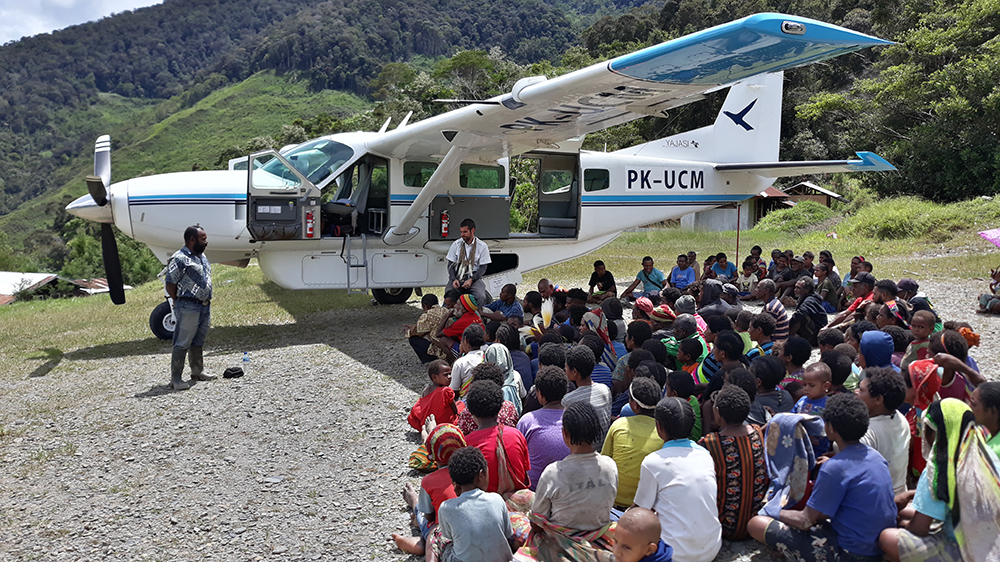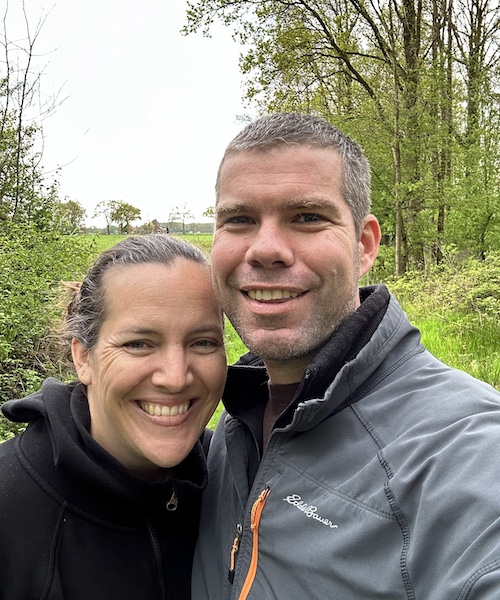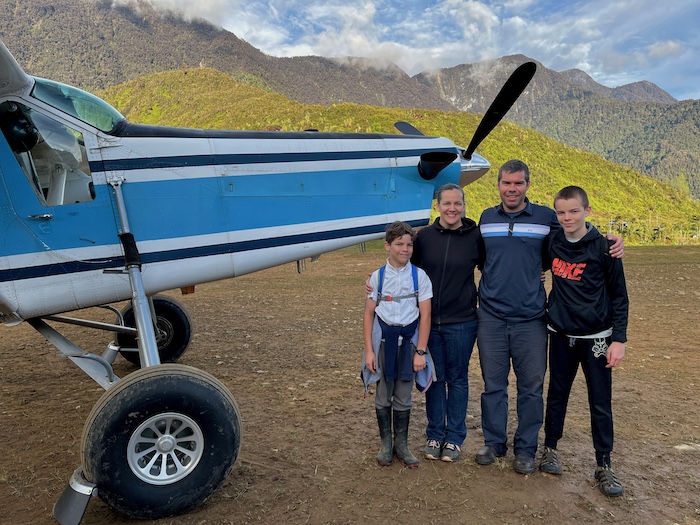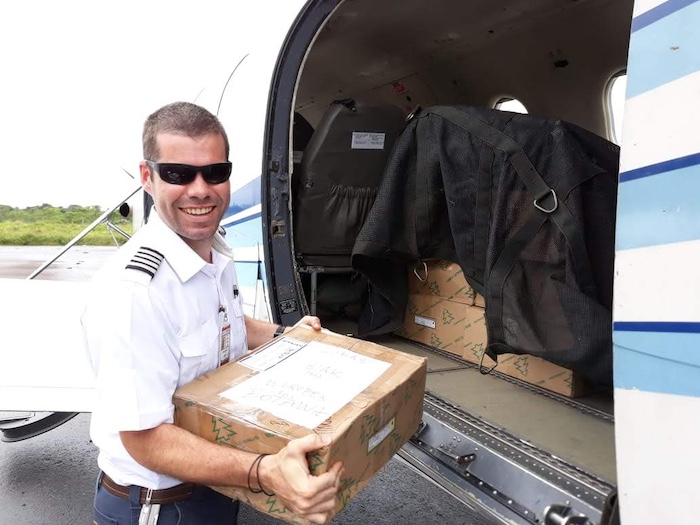Soar on Wings
- April 9, 2024

Two different paths led Kars and Missy Kroneman to Moody Bible Institute. But the guiding hand of God and their shared life experiences soon merged those paths together.
For Kars, a missionary kid from Indonesia, Moody’s aviation program was at the top of his education and career list.
“I grew up in Indonesia,” he says. “My parents are with Wycliffe Bible Translators, and my family was serviced by mission aviators. I grew up in Papua, Indonesia, in a tiny village that’s accessible only by air. Everything came in and out by airplane, and I saw the help that the pilots were to my parents in technical areas.”
Kars’ father had limited DIY skills. If anything in the home needed repairs, Kars’ mother attempted to fix it. “If the generator broke, you can imagine the stress that caused,” Kars says. “Moody pilots were required to learn maintenance. They were often able to fix something in five minutes that would have caused my parents stress for days.”
It was that level of Moody pilots’ skill and service that impacted Kars the most. “I didn’t even apply to other schools.”
Missy’s how-I-got-to-Moody story was a little different. “I really had my heart set on another school, and God firmly closed the door.”
But through that disappointment, He opened the door to Moody in 2002.
“I was really close to the deadline of needing to submit my application,” Missy says. “I was an MK in Kenya at the time. At one point, someone had to hand-carry (my application) to even make it in time. God opened the door for me to be there, and that was always really comforting and confirming to me that Moody was where I was supposed to be.”
Love and marriage
Their shared status as missionary kids connected Kars and Missy as a couple. “I helped do orientation for the new MKs and international students starting at Moody’s Chicago campus. That's how we initially met in 2004,” Kars says. “We both played indoor soccer on Mondays with mostly international students, and that's really how we got to know each other.”

The couple began dating and continued their relationship when Kars moved to Moody’s Spokane, Washington, aviation training center in 2005. Missy graduated from the Chicago campus in 2006, and they married in 2007.
“Moody Aviation is a five-year program,” Kars explains. “I took six years to do it. Moody recommended that we take a year off when we got married. I worked for JAARS, the technical arm of Wycliffe Bible Translators, in North Carolina for that year and then went back to Spokane for the final two years.”
Taking God’s Word to Indonesia
Having both grown up overseas as children of missionaries, Kars and Missy went to Moody with the thought that they would very likely be involved with missions themselves. However, when they were dating and even after they were married, they weren’t sure where the Lord might send them or which organization they would join.
With Kars’ parents dedicating their lives to Bible translation in Indonesia and with both Kars’ and Missy’s passion to reach the most unreached people groups through God’s Word, joining Wycliffe’s Indonesia team felt like a wise choice. The organization’s mission to make the Bible available in every language resonated strongly with the couple.
“There are over 7,000 languages in the world, and there are about 1,400 or so people groups that still need God’s Word in their heart language,” Missy says. “They don’t even have one word of Scripture.” After nearly a year of language school, the Kroneman family—Kars, Missy, and their two sons—arrived in Papua in October of 2013.
Communicating in Indonesian, the trade language of Indonesia, is crucial to interactions in daily life and work. More than 250 languages are spoken in Papua, Indonesia, and there are few similarities between them. “To give you an idea of the complexity,” Kars explains, “the language I grew up with has more than 250 verb forms. I can kind of understand the people who are one valley over from us, but beyond that I don't have a clue what people are saying.”
Busy flight patterns
The land mass of Papua, Indonesia, is roughly two-thirds the size of the state of Texas. Kars usually starts each workday early in the morning and completes one or two one-hour flights out of the family’s home base.
“On our first flight of the day, we start getting calls. ‘A woman in the interior who’s been in labor for three days needs a medical evacuation,’ they’ll say. Or ‘A guy just chopped off his finger,’ or maybe ‘We’re having a church conference. Can you fly our people from here to there?’” Kars says.
One goal is always in the forefront for Kars and the other mission pilots—serving the missionaries in the island’s interior.
“They’re our heroes. They live and work in super-isolated areas,” Kars says. “It may only be an hour flight, but it's a world away. It's like going from the modern age to the Stone Age, essentially.”
Challenges and opportunities of remote living
Communication in the interior is limited, and most areas don’t have cell phone coverage. Some Western missionaries have occasional satellite internet, but for others, communication happens by amateur “ham” radio powered by a solar panel and a car battery.
“They're out there for months at a time,” Kars says. “There’s no other way in or out. Mission aviation is their only lifeline. Everything that goes in there needs to be flown in.”

For Missy, days are filled with running the household, driving 13-year-old Benji and 11-year-old Jozie to and from school, and plenty of meal preparation.
“Everything is made from scratch, and you don’t have a Walmart where you can get everything you need,” she says. “There are a lot of extra steps for food prep, such as washing all the fruits and vegetables. I do have other opportunities, though. One of my favorites has been being a part of coaching the basketball and soccer teams at the kids’ school—the same mission school that Kars and his brothers used to go to. So that's a fun way that I get to be involved.”
Like Kars and the other pilots, Missy is part of the support team for Wycliffe missionaries. “For every missionary that is isolated in a village,” she explains, “there's a whole team of people behind them that will allow them to do what they need to do: the pilot who flies them in and out, the mechanics who maintain the airplanes, the supply buyers who help purchase supplies, and even the dorm at the school where MKs can come into town and attend school.”
Bringing God and His Word to Papuans
In 2022, Kars’ parents celebrated the final translation of the entire Bible into the Una language. “It was the completion of 35 years of work,” Missy says. “And just to put it into context . . . we have over 250 languages on our island. This translation is only the seventh complete Bible for those groups of people.”
In a culture of animism (the belief that objects, places, and creatures possess a distinct spiritual essence) and syncretism (merging various spiritual beliefs together), there are inherent difficulties in teaching concepts like the Holy Spirit and one true God.

“It’s fairly easy for Papuans to accept the gospel because they live in fear and darkness,” Kars explains. “They're trying to appease spirits, so what’s one more spirit? It’s easy to build a church and have people profess faith. ‘Let’s add one more faith,’ they would say. ‘Why not?’ What's challenging is to have God with a capital G be the one and only God.”
Kars was deeply moved by the testimony of an older man from the village where he grew up who now has a Bible in his own language. “He said he remembered very clearly what that darkness was like before he heard the Word of God. He said, ‘Before the gospel, we used to eat people. We lived in darkness. But God’s Word is light.’”
‘It’s all about Him’
Missy and Kars are both grateful for their years at Moody—for the excellence of the aviation program and for the deep friendships they made. They both have the same advice for Christians just beginning their missionary journey.
“Keep looking to Him and trust that He uses the obstacles and the difficulties and the challenges to guide and direct and even confirm that this is what He has for you to do,” Missy says. “That’s the place He wants us to be so that we won’t say, ‘We did this ourselves. We pulled ourselves up by our bootstraps, and we got ourselves here.’
“It has nothing to do with us. It's all about Him.”

